Future of aviation: Airbus to develop world’s first zero-emission aircraft
European aerospace giant aims to launch the hydrogen-fuelled passenger planes by 2035
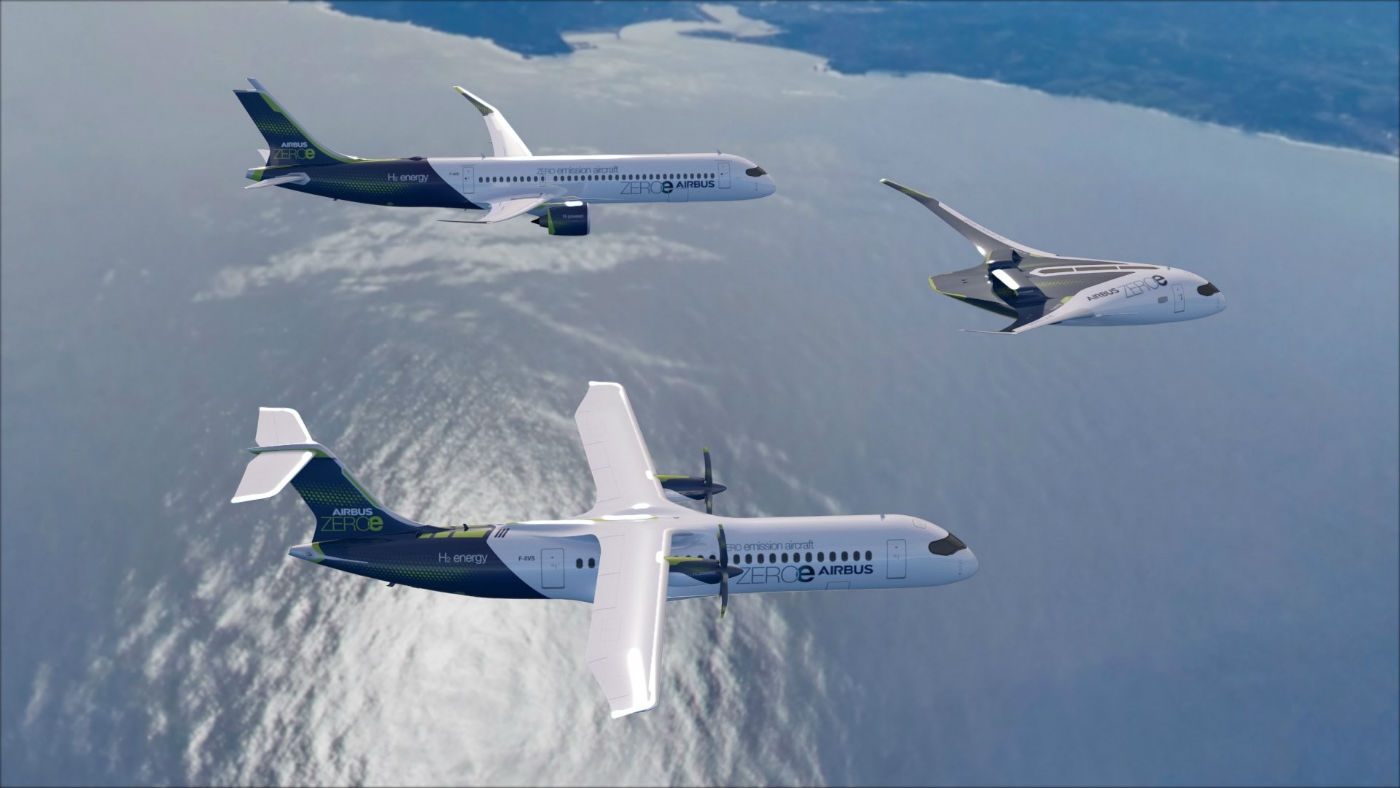
A free daily email with the biggest news stories of the day – and the best features from TheWeek.com
You are now subscribed
Your newsletter sign-up was successful
Airbus has announced ambitious plans to develop the world’s first zero-emission commercial aircraft.
Unveiling the designs of the three ZEROe concept planes, the European aerospace giant set a target date of 2035 for the hydrogen-fuelled carriers to take to the skies.
The hi-tech trio of aircraft are all hydrogen-hybrids. “This means they are powered by modified gas-turbine engines that burn liquid hydrogen as fuel,” says Airbus in a statement on the multinational’s website.
The Week
Escape your echo chamber. Get the facts behind the news, plus analysis from multiple perspectives.

Sign up for The Week's Free Newsletters
From our morning news briefing to a weekly Good News Newsletter, get the best of The Week delivered directly to your inbox.
From our morning news briefing to a weekly Good News Newsletter, get the best of The Week delivered directly to your inbox.
“At the same time, they also use hydrogen fuel cells to create electrical power that complements the gas turbine, resulting in a highly efficient hybrid-electric propulsion system.”
Airbus chief executive Guillaume Faury says the ZEROe concepts mark a “historic moment” for the commercial aviation sector, the BBC reports. And the use of hydrogen had the potential to “significantly reduce aviation’s climate impact”, by reducing carbon emissions, he added.
The combination of the Covid-19 pandemic, climate change and jet fuel price hikes has seen the aviation sector hit a turbulent patch in recent years.
In late June, after calculating the economic costs of what the Financial Times describes as this “difficult time”, Airbus announced plans to cut around 15,000 jobs - including 1,700 in the UK - from its commercial aircraft division by mid-2021.
A free daily email with the biggest news stories of the day – and the best features from TheWeek.com
But despite the many challenges facing the sector, Airbus engineers are focusing on developing their new “greener” aircraft.
Presenting the new designs, Glenn Llewellyn, Airbus VP Zero-Emission Aircraft, said: “As recently as five years ago, hydrogen propulsion wasn’t even on our radar as a viable emission-reduction technology pathway. Today, we’re excited by the incredible potential hydrogen offers aviation in terms of disruptive emissions reduction.”
.

Development and prototypes
To meet the ambitious 2035 target, Airbus will need to launch the ZEROe aircraft programme by 2025, to give the company’s engineers enough time to mature all of the required hydrogen technologies.
Over the coming months, several hydrogen demonstrator programmes, which will test hydrogen fuel cell and hydrogen combustion technologies, are expected to be launched. A full-scale aircraft prototype is scheduled to arrive by the late 2020s.
Jean-Brice Dumont, Airbus executive vice president engineering, said: “The ZEROe will be the world’s first zero-emission commercial aircraft. As an engineer, I can’t think of working on anything more exciting than that.”
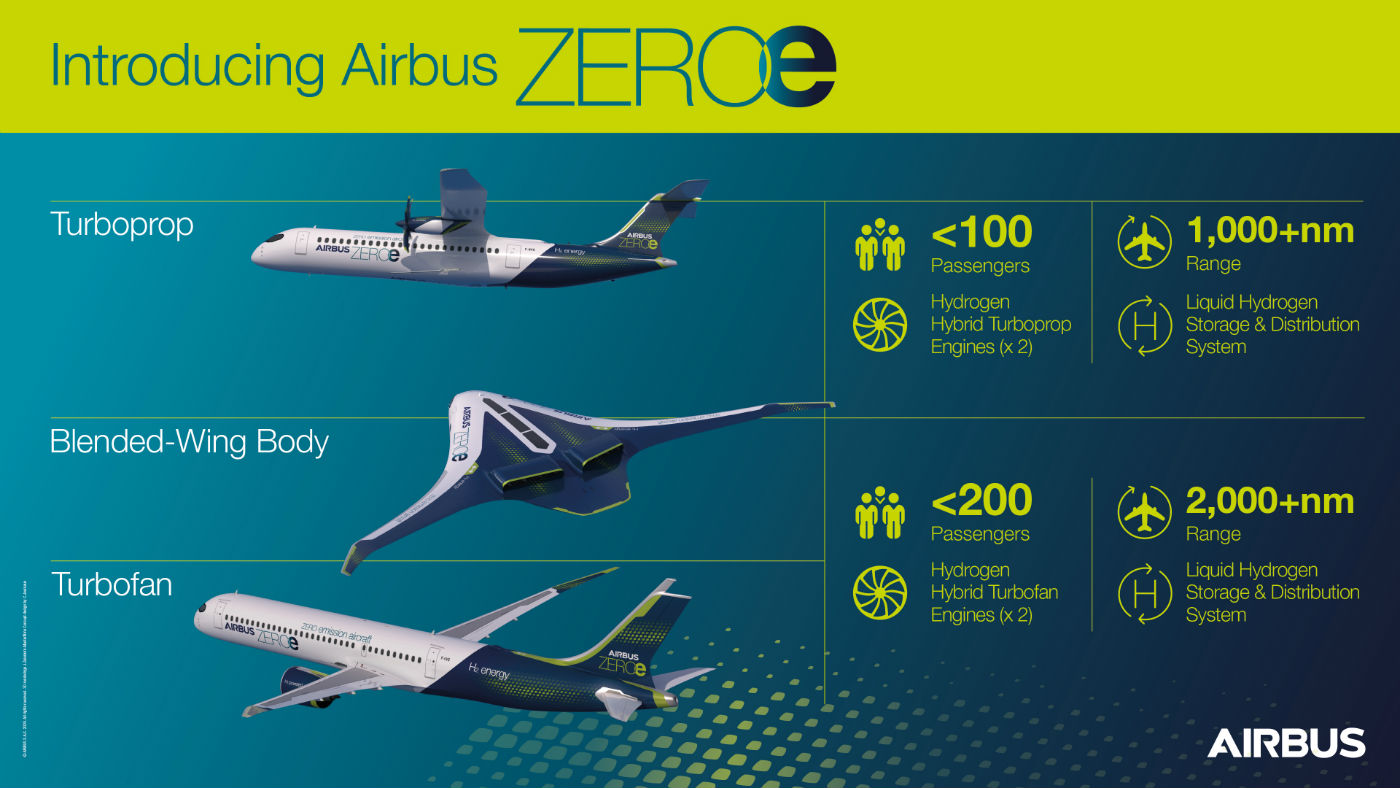
In pictures: ZEROe concept aircraft
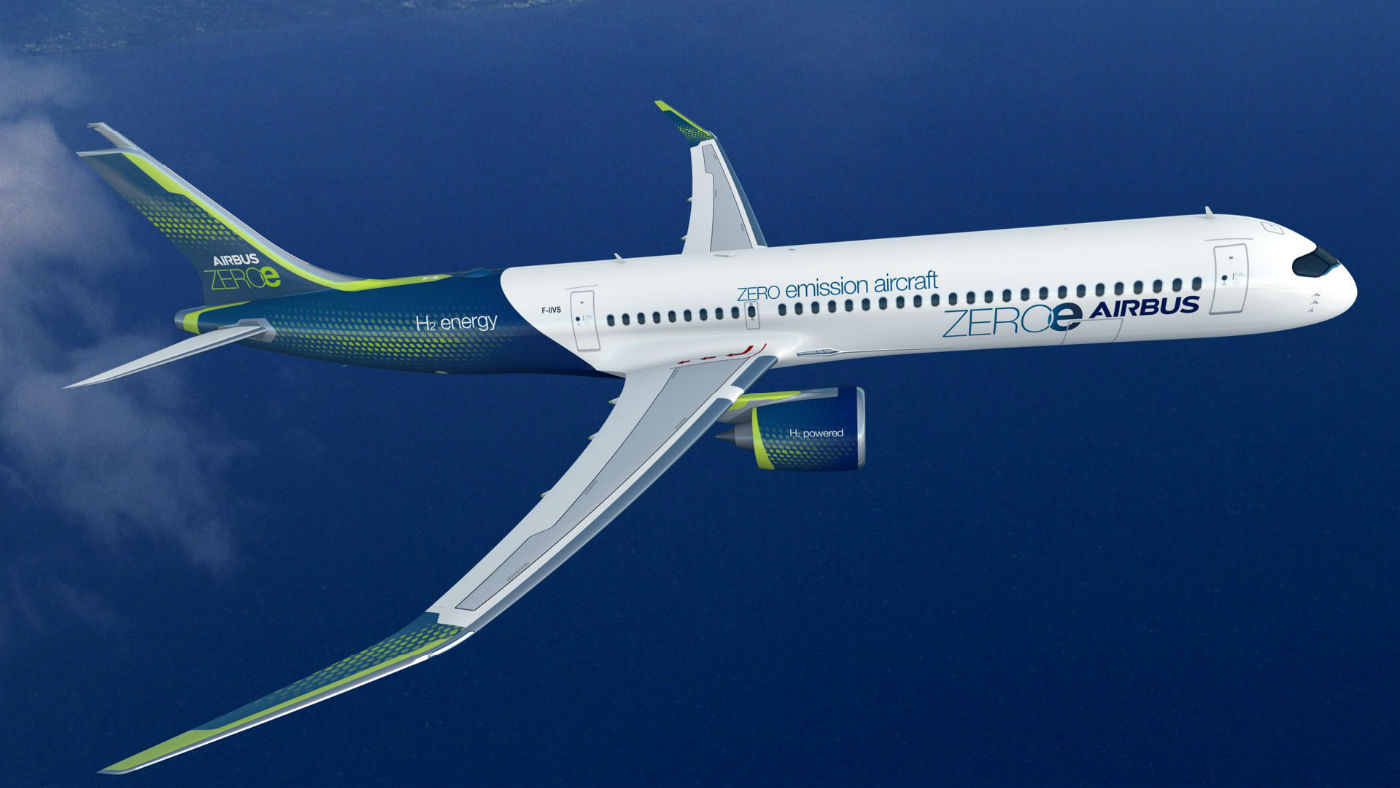
Turbofan
Two hybrid hydrogen turbofan engines provide thrust. The liquid hydrogen storage and distribution system is located behind the rear pressure bulkhead. The Turbofan is designed to carry up to 200 passengers and have a range of more than 2,000 miles.
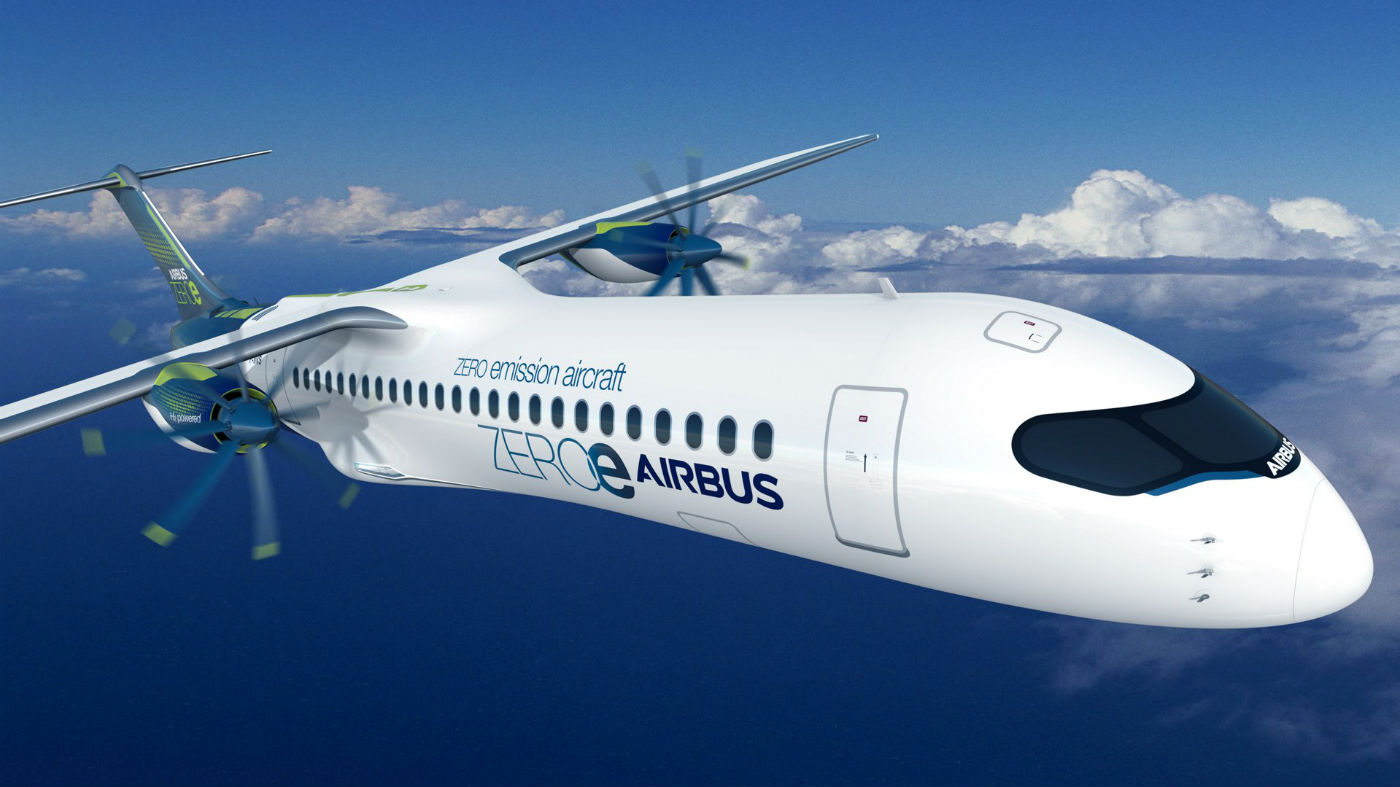
Turboprop
Similar to the turbofan aircraft, this concept’s liquid hydrogen storage and distribution system is located behind the rear pressure bulkhead. However, two hybrid hydrogen turboprop engines, which drive the six-bladed propellers, provide thrust. The aircraft will carry 100 passengers and have a range of more than 1,000 miles.
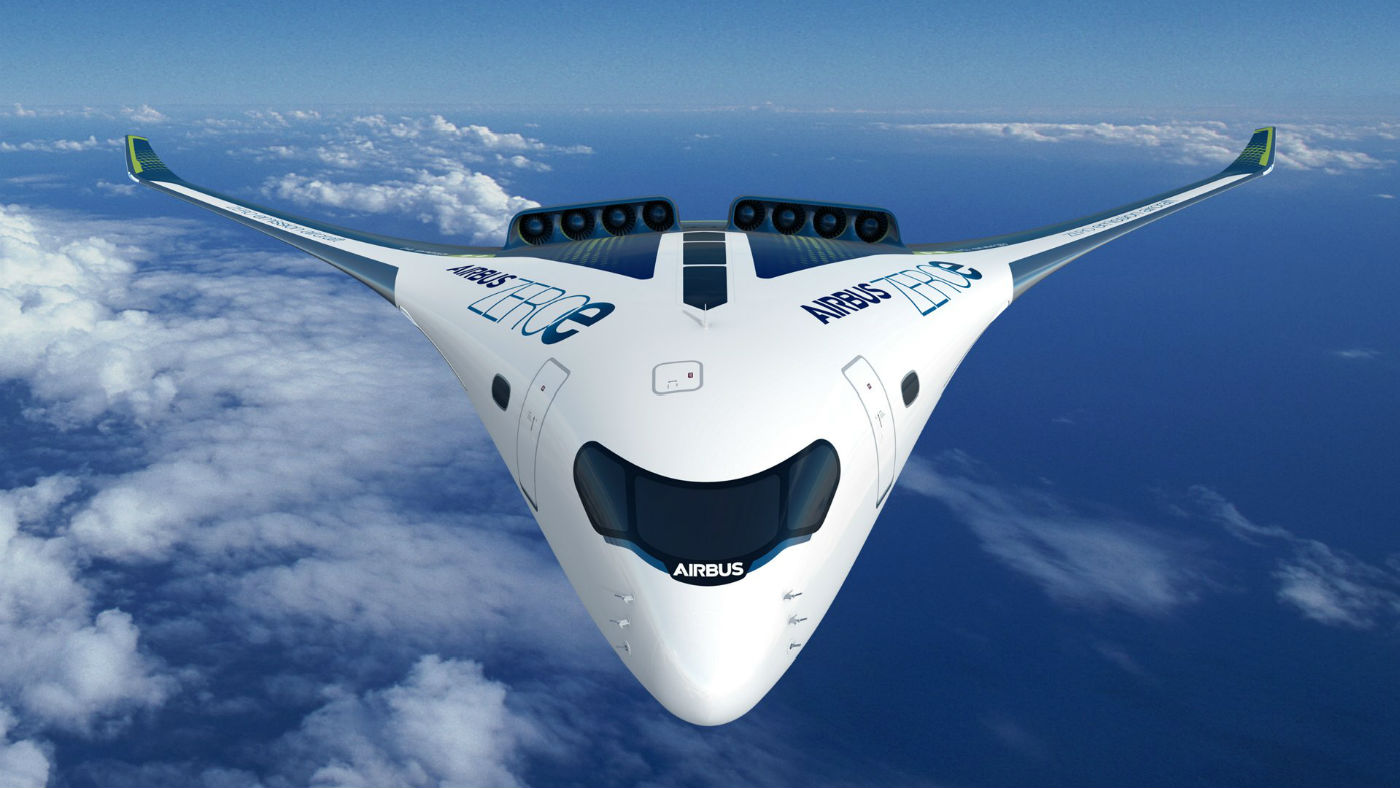
Blended-Wing Body (BWB)
This configuration features an exceptionally wide interior, which opens up multiple options for hydrogen storage and distribution. In this example, the liquid hydrogen storage tanks are stored underneath the wings. Like the Turbofan aircraft, two hybrid hydrogen turbofan engines provide thrust. The BWB will carry up to 200 passengers and have a range of more than 2,000 miles.
Mike Starling is the former digital features editor at The Week. He started his career in 2001 in Gloucestershire as a sports reporter and sub-editor and has held various roles as a writer and editor at news, travel and B2B publications. He has spoken at a number of sports business conferences and also worked as a consultant creating sports travel content for tourism boards. International experience includes spells living and working in Dubai, UAE; Brisbane, Australia; and Beirut, Lebanon.
-
 Political cartoons for February 12
Political cartoons for February 12Cartoons Thursday's political cartoons include a Pam Bondi performance, Ghislaine Maxwell on tour, and ICE detention facilities
-
 Arcadia: Tom Stoppard’s ‘masterpiece’ makes a ‘triumphant’ return
Arcadia: Tom Stoppard’s ‘masterpiece’ makes a ‘triumphant’ returnThe Week Recommends Carrie Cracknell’s revival at the Old Vic ‘grips like a thriller’
-
 My Father’s Shadow: a ‘magically nimble’ film
My Father’s Shadow: a ‘magically nimble’ filmThe Week Recommends Akinola Davies Jr’s touching and ‘tender’ tale of two brothers in 1990s Nigeria
-
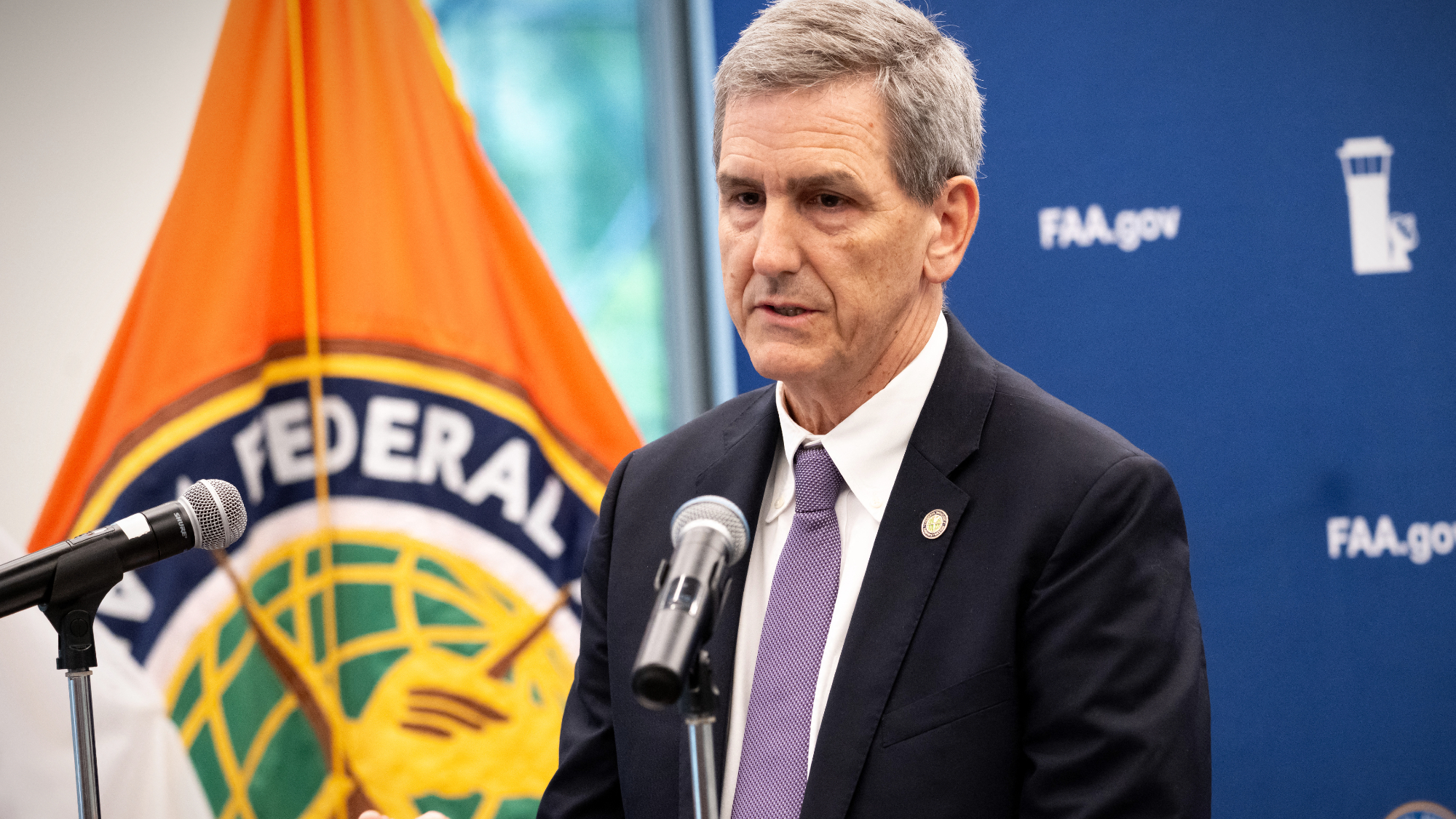 Boeing releases safety plan to skeptical FAA
Boeing releases safety plan to skeptical FAASpeed Read The Federal Aviation Administration demanded the plan after a door blew out on a Max 737 flight
-
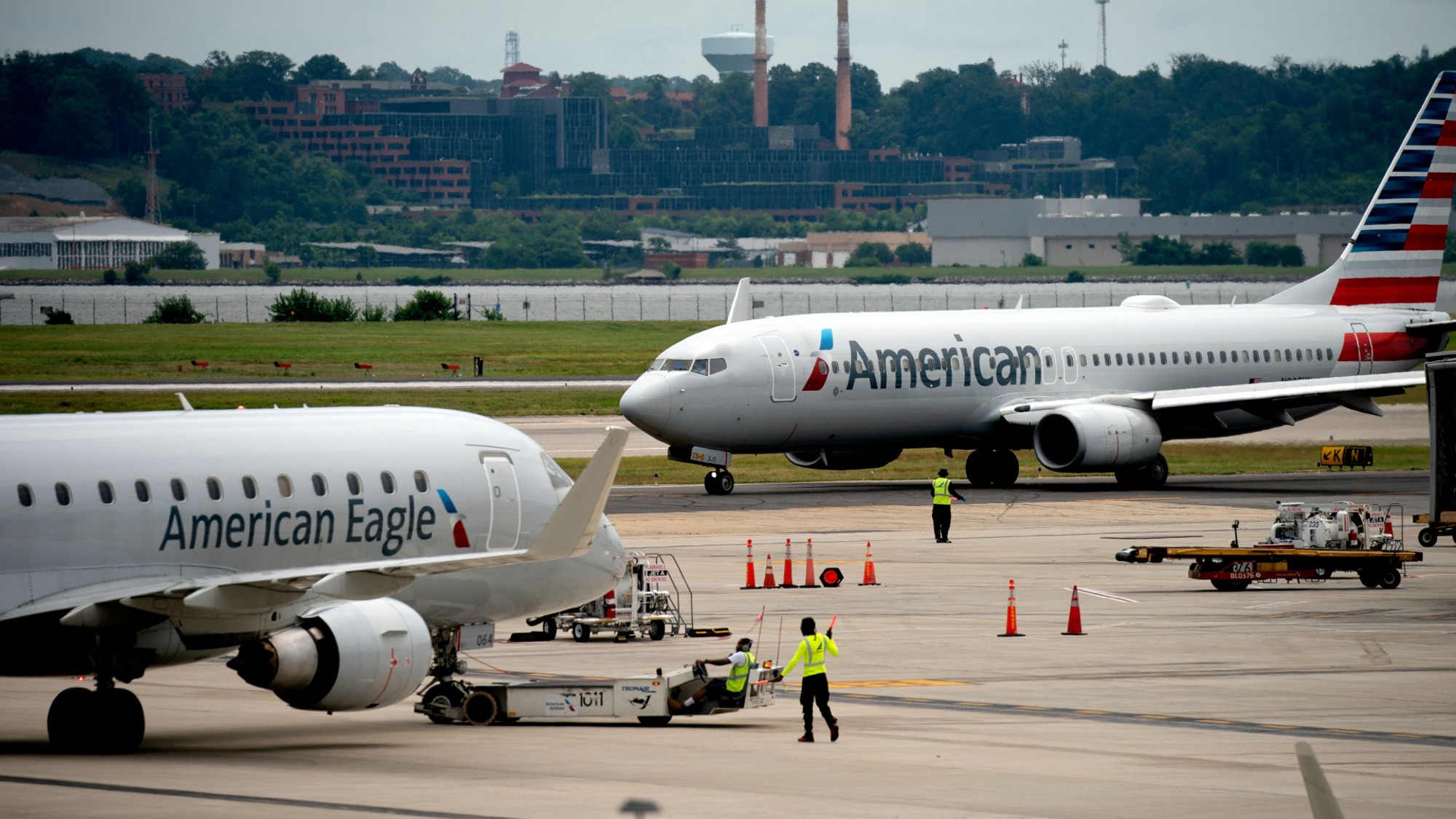 American Airlines pilots are warning of a 'significant spike' in safety issues
American Airlines pilots are warning of a 'significant spike' in safety issuesIn the Spotlight The pilot's union listed 'problematic trends' they say are affecting the airline's fleet
-
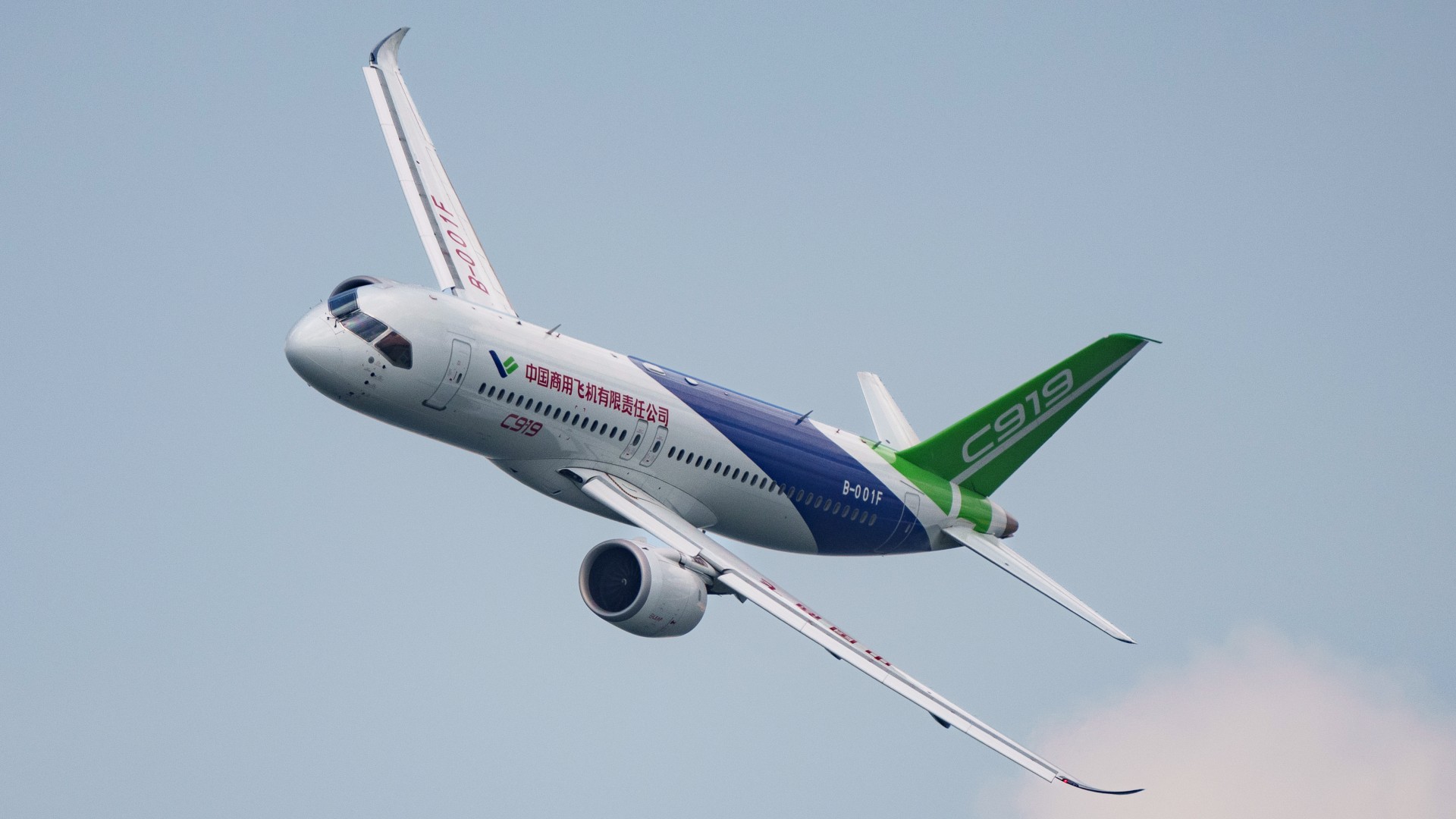 Boeing's problems have become an opportunity for China's plane manufacturer
Boeing's problems have become an opportunity for China's plane manufacturerUnder the Radar COMAC is looking to pass both Boeing and Airbus in the international market
-
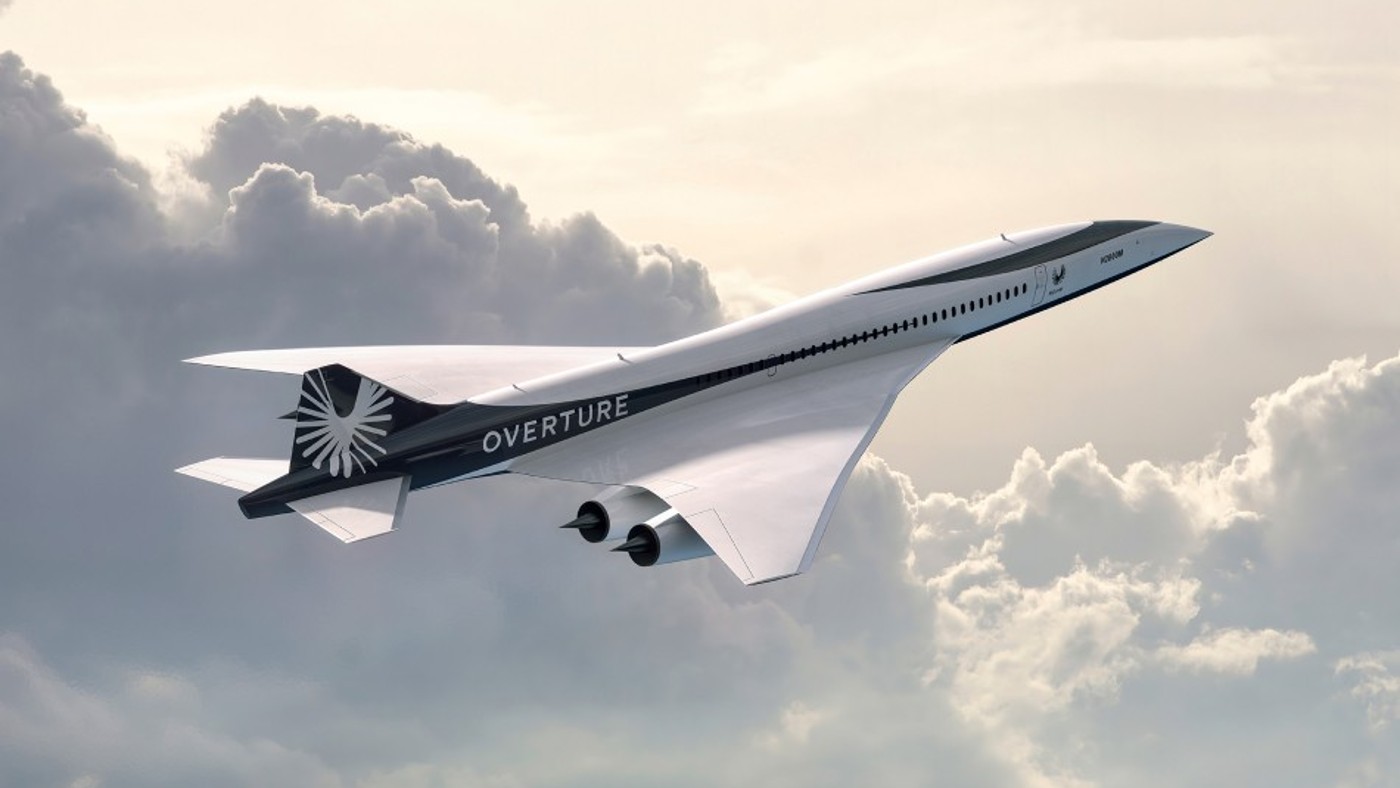 Boom Supersonic: is the ‘son of Concorde’ just a fantasy?
Boom Supersonic: is the ‘son of Concorde’ just a fantasy?Under the Radar Claims of profitable ‘ultrafast jet travel’ have been met with ‘intense industry scepticism’
-
 Labour shortages: the ‘most urgent problem’ facing the UK economy right now
Labour shortages: the ‘most urgent problem’ facing the UK economy right nowSpeed Read Britain is currently in the grip of an ‘employment crisis’
-
 Will the energy war hurt Europe more than Russia?
Will the energy war hurt Europe more than Russia?Speed Read European Commission proposes a total ban on Russian oil
-
 Will Elon Musk manage to take over Twitter?
Will Elon Musk manage to take over Twitter?Speed Read The world’s richest man has launched a hostile takeover bid worth $43bn
-
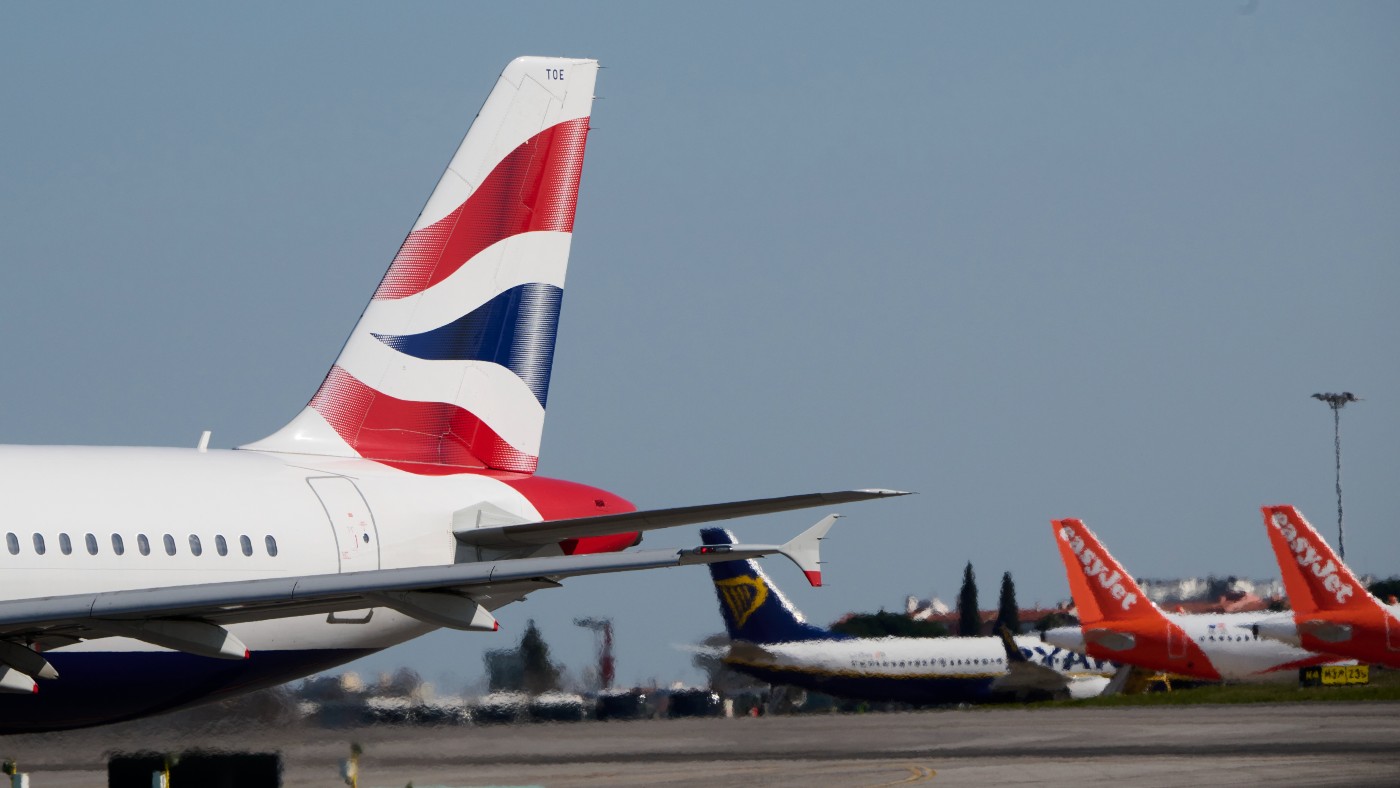 Travel is back: is the UK aviation industry ready for the big take-off?
Travel is back: is the UK aviation industry ready for the big take-off?feature After two years of chaos caused by Covid-19, airports and airlines are now hit by a staffing crisis